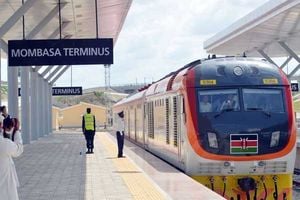
President William Ruto shakes hands with Kisumu Governor Anyang Nyong'o after he laid a foundation stone for the construction of an affordable housing project in Kisumu County.
Sealing a deal on the extension of the standard gauge railway from Naivasha to Malaba and the dualling of the Nairobi Northern bypass top the agenda of President William Ruto’s tour to China.
The President leaves the country this evening for China where he is expected to join other African leaders for this year’s Forum on China-Africa Cooperation (FOCAC) that opens this week in Beijing.
State House announced conclusion of discussions on new cooperation projects including the SGR phase 2B and 2C (Naivasha-Kisumu-Malaba) and commencement of talks on establishing a pharmaceutical park, Preferential Trade Agreement (PTA) and Investment Protection Agreement (IPA) are in the agenda of the president’s talks with his Chinese hosts.
Other agreements are expected on construction of rural roads across the country, the Nairobi Intelligent Transport System, Bosto Dam Water Supply Project as well as phase III of the upgrading of equipment in technical and vocational training (TVET) workshops.
President Ruto will also hold talks with his host President Xi Jinping “to discuss strengthening bilateral ties and exploring new areas of cooperation between Kenya and China,” according to State House spokesperson Hussein Mohamed.
This event in Asia, will mark his first international trip outside the continent after the Gen Z protests, that saw the contested Finance Bill, 2024 withdrawn and his inaugural cabinet dissolved.
Dr Ruto attendance comes in sharp contract to his 2022 presidential campaigns remarks about the overspending on Chinese-built infrastructure projects under the Uhuru Kenyatta government, such as the multi-billions shillings Expressway and the Standard Gauge Railway (SGR).
The conference also comes after the 2021 edition in Dakar, Senegal, at the height of the Covid-19 crisis, and others in Beijing and in South Africa graced by Chinese President Xi Jiping.
African heads of state and governments, senior ministers and business leaders will converge in Beijing from September 4 to 6 for the ninth edition of FOCAC that is expected to put emphasis on climate connectivity and coalitions and seek to strength the economic ties between Africa and China, at a time the latter faces threats from the United States (US) and its allies.
The theme of this year’s summit, which is held every three years alternately in China and Africa, is ‘Joining forces to promote modernisation and build a high-level China-Africa community of shared future’.
China’s three key goals for the China Africa Cooperation Vision 2035 plan is significant as it directly links the summit with Beijing’s own China Vision 2035 planning document, which sets a series of intermediary development goals in preparation for the centenary of the People’s Republic of China in 2049.
The plan has concrete goals: to increase cumulative Chinese investment in the continent to $60bn and to increase two-way trade to $300bilion per year. These ambitions dovetail with China establishing large-scale new trade and logistics routes, expanding its links with different Global South regions beyond traditional shipping lanes.
President Xi elevated Kenya’s relations to china to a strategic level during President Kenyatta’s tenure, and even got its backing for the non-permanent seat at the United Nations Security Council (UNSC).
President Ruto visit comes as Kenyans are opposed to the government’s borrowing spree for development, and the country’s public debt also owed to china.
However, one focus of the meeting would be exchanging governance experience to speed up modernisation.
The meeting will seek to further strengthen exchanges and mutual learning, promote people to people contact and affinity, take confident steps to bring about new progress in their respective civilization, and generate new energy for china and Africa to build a community with a shared future for mankind.
As President Xi notes, “diversity of civilization should not be a source of global conflict, rather, it should be an engine driving the advance of human civilization”
“China will, as always, give Africa full support as the continent modernize in its own way and holds its future destiny firmly in its own hands,” reads Chinese dispatch.
Just like pineapple export from Benin to China, Citrus from South Africa, Kenya is also not left behind in terms of exports, with its avocados.
According to Beijing, its cooperation with Africa is part of the South- South cooperation, which is based on equality and consent.
China has put in place ten cooperation plans, eight major initiatives and nine programs under the framework of the FOCAC to support Africa’s development and revitalization.
For over 15 years now, china has remained Africa’s largest trading partner. Two-way trade hit a record high of $ 282.1 billion in 2023. It is also Africa’s largest source of investment among developing countries.
By the end of 2022, the stock of Chinese direct investment in Africa had topped $40billion and more than 3000 Chinese companies invested and having businesses in the continent. The Nairobi Mombasa SGR is an example of the development projects in Kenya.
President Xi will attend the opening ceremony of the 2024 Summit on September 5th and deliver a keynote speech.
During the summit, Xi will host a welcoming banquet and relevant bilateral events for the leaders of FOCAC's African members and representatives of relevant African regional organizations and international organizations invited to the summit.
The summit is held after a gap of 6 years, which will see China and Africa leaders meet in Beijing to renew their friendship and discuss cooperation plans.
The meeting seeks to deepen political mutual trust and the upgrade pragmatic cooperation between China and the continent, and to consolidate consensus and strength in building a high-level China-Africa community with a shared future.
Xi attaches high importance to China-Africa cooperation as he been involved in the planning of China-Africa relations, providing important guidance for the steady and long-term development of China-Africa ties.
During his visit to Johannesburg, South Africa Africa in March 2013, Xi put forward the principles of China's Africa policy - sincerity, real results, amity and good faith, and pursuing the greater good and shared interests, charting the course for China's cooperation with Africa, and providing the fundamental guidelines.
At the FOCAC Johannesburg Summit in December 2015, Xi announced to implement ten major cooperation plans with Africa, and both Chinese and African leaders agreed to upgrade the new type of China-Africa strategic partnership to a China-Africa comprehensive strategic and cooperative partnership.
Three years later, Xi chaired the 2018 Beijing summit of the FOCAC and delivered a keynote speech at the opening ceremony.
He announced that to build an even closer China-Africa community with a shared future in the new era, China will, on the basis of the ten cooperation plans already adopted, launch eight major initiatives in close collaboration with African countries in the next three years and beyond.
In November 2021, Xi attended the opening ceremony of the Eighth Ministerial Conference of the FOCAC and delivered a keynote speech. He summarized the everlasting spirit of China-Africa friendship and cooperation, and announced that China will work closely with African countries to implement nine programs.
Since the inception of the FOCAC in 2000 and the China-Africa Development Fund in 2006, China’s economic ties with Africa has deepened significantly.
Over the past two decades, the summit has had its impacts and implications of China’s growing economic presence on the continent.
Ahead of the FOCAC, the Boston University Global Development Policy Center has produced a suite of research investigating the trends, outcomes, benefits and risks of China’s economic engagement with Africa.
Its captures a new update to the Chinese Loans to Africa (CLA) Database, managed by the University which estimates that from 2000-2023, Chinese lenders provided 1,306 loans amounting to $182.28 billion to 49 African governments and seven regional borrowers.
In 2023, Chinese lenders issued 13 new commitments with a value of $4.61 billion to eight countries and two regional financial institutions.
This represents the first time the annual loan amount to Africa has risen since 2016 but is far below the early years of the Belt and Road Initiative (BRI), in which cumulative commitments surpassed $10 billion annually.
It therefore analysis the Chinese lending to Africa ahead of the 2024 Summit, with the findings suggesting that, going forward, China will likely continue to pursue a bifurcated strategy of risk-averse experiments with borrowers that received fewer loans in past years and decidedly riskier forms of engagement with its longtime partners.
Additionally, the size of future individual loans is expected to shrink, even in countries that have a long history of engagement with China, as the pre-pandemic pipeline of big-ticket projects empties out.
At the 37th ordinary session of the assembly of the African Union (AU), the Africa Union Commission (AUC) chairperson Moussa Faki Mahat called for ‘a truce renaissance of nationalism and Pan-Africanism’
As a precious political legacy of Africa the unstoppable trend of the times, Pan- Africanism is bound to become a powerful driving force for African countries’ endeavor to seek strength and foster development through unity.









